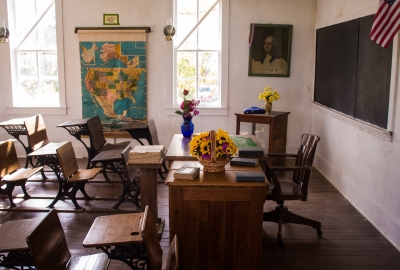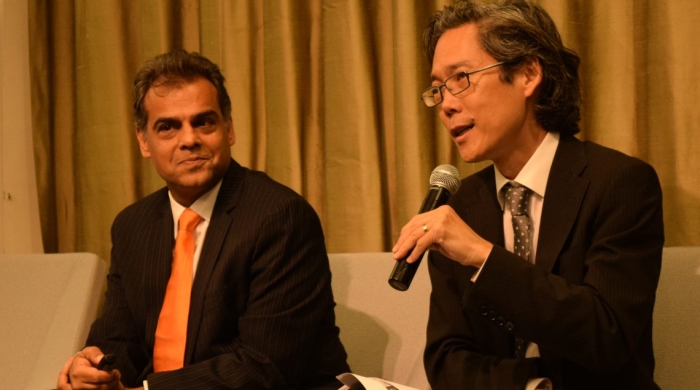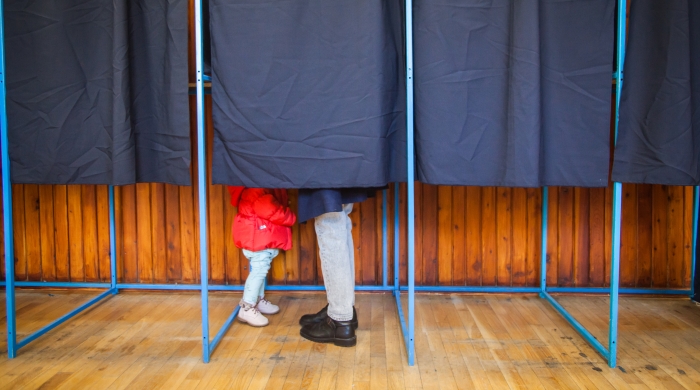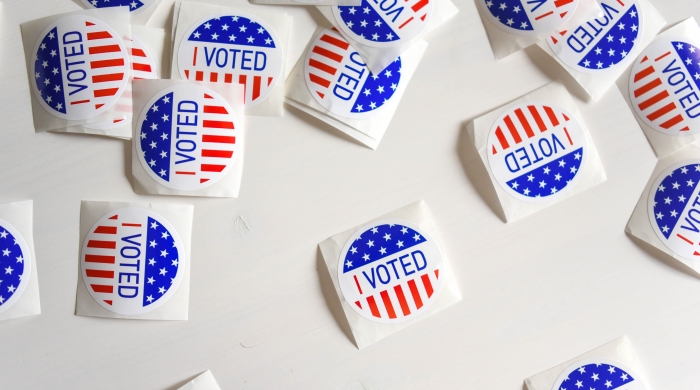
This summer, Vice President Joe Biden and Senator Bernie Sanders’ Unity Task Forces released a set of policy recommendations that covered topics from climate change to immigration. Dr. Hirokazu Yoshikawa, Courtney Sale Ross University Professor of Globalization and Education at NYU Steinhardt and Co-Director of NYU’s Global TIES for Children center, served as a member of the Unity Task Force on Education. He enlisted five PhD students from NYU Steinhardt’s Psychology and Social Intervention (PSI) program: Sophia Hwang, Andrew Nalani, Olga Pagán, Sarah Rosenbach and Alex Watford. Together, they assisted Dr. Yoshikawa’s research into the education policies outlined in the Task Force’s final report.
The Institute of Human Development and Social Change (IHDSC) spoke to the students about the fast-paced nature of the work and their thoughts on how to utilize research to inform national education policy. Their remarks were edited for clarity and length.
What previous work, research activities, or internship experiences helped prepare you for supporting Dr. Yoshikawa’s work on the Task Force?
Andrew Nalani: The Task Force work came on the heels of completing my practicum work with an organization called Partners for Youth Empowerment. My role was to support the organization in articulating an evidence informed theory of change. I think a lot of my learning was how do you take ethereal research language and translate it in ways that are accessible and in ways that are actionable and impactful without losing the complexity and the richness from the research angle. I came to this work after having gone through a whole challenging year of trying to do the translation. I feel a sense of more comfort with the policy arena than I had ever felt. I always considered it to be “that's the thing that other people do. Not me.” It was a real learning experience.
Olga Pagán: I was prepared for the fast pace nature of helping Dr. Yoshikawa with the Task Force because of my experience as a teacher. Research typically moves at such a slow pace, but with Task Force work, every day there was a new task and I’d think, “Oh, I know what this is like!”
The expectation was never perfection, rather what are the strongest ideas, what is the strongest evidence that you can find to support the ideas? Dr. Yoshikawa also really encouraged us to think about our own work inside and outside the academic space and to bring evidence to the fore for topics that may or may not have been covered or suggested by the taskforce itself. I felt really empowered to contribute in multiple ways, but also that fast paced nature was a relief for me.
Sophia Hwang: I'm also a former teacher, and am motivated by finding a way to respond to a problem or articulating a problem and thinking about the way to solve it. Teachers provide the most important perspective when considering how to shape education policy because they have the lived experience and do not consider educational issues in an abstract way — they know about the needs and how issues vary school-to-school and district-to-district.
Before coming to NYU, I gained experience working to strengthen trauma-informed professional development offerings for social service professionals through the Health Federation of Philadelphia. I also worked at PolicyLab based at the Children's Hospital of Philadelphia, where I conducted policy-relevant research to foster collaboration among various agencies within the city of Philadelphia. Two key lessons learned from these policy experiences was the need to be responsive and think creatively about at-scale solutions that served the greater population.
Dr. Yoshikawa was on the Education Task Force, but we widened our scope to consider economic, environmental, and health implications of education as well. I believe my training as an IES-PIRT fellow really helped me to think in this interdisciplinary, holistic way.
You mentioned the fast-paced nature of this work. Could you give an example of the type of work or questions you were asked to respond to?
J. Alex Watford: We were trying to distill everything we looked at, all the research, all the findings, all the details that we found, into what was often one or two bullet points in a one or two page document. As researchers, we are trained to know the entire landscape of a topic. To know all the background literature and to review the studies that have been done.
I learned what was really valued in a policy setting, what kinds of research tended to be valued and where people tend to go for their sources. Those are nonprofit research institutions or think tanks who do big summaries on a topic. You're looking for a number, you're looking for a key takeaway that is the impactful thing to draw from an entire field of research on the topic.
One of the challenges for me was shifting that frame of thought. To go from, how do I make sure I'm adequately representing all of the information that's available about this topic, to how do I make sure that I'm conveying the most important piece or two pieces of material for the takeaway for this particular topic? And then doing that lightning fast in a couple of days, if not by the next day.
Sarah Rosenbach: I think the framing of these documents is also important. What happens to them once we've created them? Dr. Yoshikawa was instrumental in his role on the Education Task Force when he suggested the idea to do these one- or two- page research briefs on certain topic areas. Dr. Yoshikawa would send our documents to the Education Task Force and they would discuss them in their meetings. Our research briefs were a lay of the land, but they also functioned as the talking points that Dr. Yoshikawa used when he was trying to advocate for certain policies in the Task Force’s negotiation process.
Andrew Nalani: The goal was to say, “How do we put the best ideas forward?”
Sophia Hwang: Our efforts manifested in two main approaches. The first was making concrete, specific, evidence-based recommendations. This included making the case for why these recommendations were important. The second was what Olga mentioned, about how Dr. Yoshikawa empowered us to think about the framing and the broader narrative. We’re making specific, concrete recommendations, but collectively and holistically, why does this matter? For each of our memos, we wrote openings or “preambles” that addressed, “Why is this important? Which populations are overlooked? How does this all fit together in the grander scheme?”.
What else did you learn from collaborating together, or as Alex put it, what did you learn on the job?
Olga Pagán: Because education is so decentralized, it was interesting to learn what you could or could not say in a federal policy document and what the federal government actually does and does not have control over.
Could you give an example?
Olga Pagán: We were trying to think about curriculum pieces. Generally, curriculum is something that the federal government has little power over. So the policy language was more general than about specific curricula, but definitely about aspects of learning like civic engagement, community service or holistic learning.
Policy documents are not about morals. Nothing in the policy document says “we're doing this because it's good” or “you have to do this because it's the right thing.” So it was an interesting lesson on what it means to do federal policy in a capitalistic society.
As Sophia was saying, after having worked now at the classroom, school, and district level, and now thinking about the federal level, the policy process has been really eye opening for me. Where is the spot where you can make this particular change? Is it at the federal level, or is it working in a school or somewhere in between?
J. Alex Watford: Olga used the word decentralized and it made me think about how decentralized the local government and much information on education is. It was all over the place. It was impossible to go to a single place and find all the numbers you needed. Also, finding out about the small amounts of money dedicated to issues that I felt deserved a lot more funding, and the conflicts around that funding was really eye opening for me.
After supporting Dr. Yoshikawa’s work on the Task Force, how do you approach the idea of scaling your research to a national setting or translating policies to higher levels?
Andrew Nalani: Usually, we think of scale as developing the perfect product at the front end and then generating buy-in as you go along. In this case, I think it was slightly different. There were multiple stakeholders already at the table from the get go. You have a Task Force that has members from the teachers unions and other sectors, so the different interests are represented at the table. Then you have our team of researchers who are supporting Dr. Yoshikawa with this work. We are coming from different areas of expertise.
In addition to walking through the different campaign platforms, Dr. Yoshikawa was encouraged to consult informally and widely so had us identify field experts in each content area. Who are people studying different aspects of K12 policy? If it's related to National Service, who are the people researching and talking about these issues? Who we should be speaking with? He led the setting up of these meetings and he invited us to be part of those conversations. After the meetings, we would consider how to bring in different voices to shape how the sausage is being made, instead of waiting for the sausage to be made and then distributing it? I think that is particularly noteworthy, especially when we think about who gets represented in policy spaces. Who has the cultural capital, social capital and the economic capital to be able to sit at the table when policies are being shaped? It was a little glimpse into what a participatory policy making might look like, but also in many ways, it speaks to Dr. Yoshikawa’s nature. The daunting aspect of the project was to go through all this research and policy information. He involved people to be a part of that, and I think that is pretty noteworthy in a policy making process.
J. Alex Watford: I've been thinking a lot about this in two ways. On the one hand, it makes me interested in working at a think tank where clearly there's a lot of public influence. On the other side, thinking specifically about my own experiences, my own area of interest is school segregation and also inequality between schools. This I think helped me begin to reframe some of my questions in a way that reflects the reality of how difficult it is to implement change.I think this work shaped how it's going to affect the way that I ask not just “is this the best practice the best for everyone?” but also how I discuss the financial benefit of the practice or policy. That is clearly an important piece that's guiding whether or not something gets implemented, so I'm taking that to heart.
Personally, if you had to pick one evidence-based educational policy to recommend above all others, what would it be and why? Why is it important and who is important for?
Sophia Hwang: Increase funding for community schools. Especially with the pandemic, we're seeing that schools do more than “just” providing an education. They are feeding students and families and providing both physical health and mental health support to the community. There's a rich body of rigorous research that documents the success of these programs. We need to make sure that these schools are adequately funded, that the nurses, social workers, psychologists, teachers — all of the professionals within the schools — are adequately supported. I think this is one of the best investments we can make in our educational system.
J. Alex Watford: I think that the policy that is clearly backed up by research and that has a clear benefit is reducing the role of police officers in school settings and replacing that role with mental health care professionals that are trained in conflict and non-violent conflict resolution. These professionals can begin to support individuals in those schools in a better way then immediately involving them in the justice system. So, that continues to be a high priority thing for me because there isn't any proof, any reliable, consistent proof that having school resource officers in schools makes them any safer, but there is consistent, reliable proof that it increases youths' contact points with the criminal justice system. Frankly, it's part of the school to prison pipeline, regardless of how you feel about the buzzword term, it disproportionately affects black and brown kids and leads them to not be able to benefit from the education system that's supposed to be a great equalizer.
Andrew Nalani: I do think it could have consequential directions to incentivize and enable networks of schools to adopt continuous quality improvement for teachers as a way of supporting their professional development versus simply relying on these very strict standard based assessments of benchmarks for teachers. The challenges that education institutions are facing in a time like this are requiring not just students to be considered as learners, but adults as well. Coming back to what I do my research on, it's amazing to me to see the divide between child and adolescent development and adult development. We know a lot about what conditions young people are going to learn in best. Are teachers being empowered to create those conditions? No. Do we have research on the best adult development out there that can fund those efforts? Yes, we do. I think that really digging in and asking the question, “who is benefiting from keeping things the way they are?” and “who is not, is appropriate in this case” How do we begin thinking about how we create learning environments for teachers in order to reshape and empower them to create the learning conditions that we know work well for students?
Sarah Rosenbach: During this process, we were heartened to learn that the Supreme Court ruled that discrimination based on sex in employment also applies to LGBTQ folks. However, there's been an act that has been introduced in the House and Sentate but only passed in the House to date, The Equality Act, which would prohibit discrimination on the basis of sex, sexual orientation and gender identity across key areas of life, including employment, housing, credit, education, public spaces and services, federally funded programs, and jury service, I think that passing the Equality Act is incredibly important because, at a federal level, LGBTQ students lack legal protections. So as a result, when LGBTQ students face discrimination and victimization in our schools, they have limited legal recourse. Having explicit non-discrimination policies protecting these students, who are or are perceived to be LGBTQ, gives both teachers and administrators the tools that they need to protect all students. Creating a safe and equitable learning environment is incredibly important for all students, regardless of sexual orientation, gender identity, and gender expression.
Olga Pagán: The idea of picking one policy is a really interesting question, because I don't believe that you can have one policy to fix everything. Each of you has given the answer that aligns with the passions that have driven you in your research. I agree with all of those things and think that all of those things are incredibly important. And I'm trying to think of the one policy that, to use Andrew's language, set the conditions for all of those things to happen.
I think it's about agreeing, as a nation, about the role of education in society. I don't think that we've done that as a nation. Different classes and different races of people think that schools are meant for different things. Seeing the policies that we put together, I think we're unified on what we believe schools should do and be. I think we view schools as a place for individual and community enrichment and realization, and I think that comes through. In the taskforce recommendations, we talk about community schools, not incarcerating children, developing adults as we develop children, not discriminating based on gender and sexuality expressions. But I think until we get to a place where as a nation we agree that those are important aspects of education, there's not really a policy that magically fixes those things.
Related Blog Posts
Q&A: Dr. Ajay Chaudry & Dr. Hiro Yoshikawa on Cradle to Kindergarten
Cradle to Kindergarten, A New Plan to Combat Inequality, puts forward a comprehensive, research-driven policy strategy to invest in early-childhood education, provide opportunities for American families, and reduce inequality. The authors, Dr. Ajay Chaudry, Dr. Taryn Morrissey, Dr. Chistina Weiland, and Dr. Hiro Yoshikawa, present an ambitious plan that includes paid parental leave, child-care guarantees for working families with young children, universal early education starting at age 3, and reimagining a Head Start program focused on children under age 3.
Where Do Candidates Stand on Early Education Policy?
Early education policies, such as New York City’s Pre-K for All, have garnered attention on the 2020 presidential campaign trail. Support for free, high-quality early education must be contextualized within research in order to better understand why the education of young children matters and what these policies mean for our cities, states, and nation.
The Intersection of Research and Civic Engagement
Politicians and voters continue to debate policies and issues tied to IHDSC’s areas of research. IHDSC surveyed our faculty affiliate network about the intersection of research and civic engagement.




